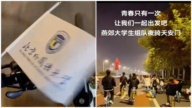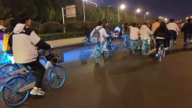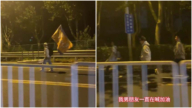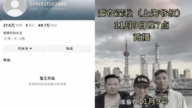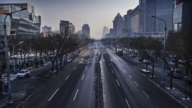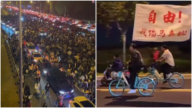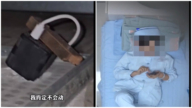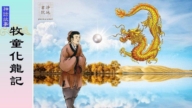【新唐人2011年9月2日讯】中国多家环保组织8月31号联合发布调查报告,指责苹果公司漠视在华供应商污染和毒害,以牺牲环境和公众健康为代价,生产“毒苹果”和“血苹果”,攫取超额利润。香港一个民间团体也发出声明,呼吁苹果新总裁库克能够解决苏州一家苹果供应公司137名工人中毒问题。
中国五家非政府环保组织31号发表名为《苹果的另一面2:污染在黑幕下蔓延》的报告,指出1月20号就已发布了第一份报告,但是,苹果公司一直不回应在华供应商的一系列污染问题。
两次调查中,环保组织发现了27家在华苹果供应商存在严重环境问题。但是,苹果公司发布的《2011年供应商责任报告》中,没有发现一例环境污染问题。
报告列举了江苏昆山的凯达电子和鼎鑫电子,因排放毒气被反复投诉,邻近一个村2000年以来就有20名村民患癌症或因癌症死亡,无助的村民们手持污水水样,跪求制止企业污染。
台湾鸿海集团投资的富士康也在污染企业之列。今年5月,成都富士康生产苹果iPad2的工厂发生爆炸,造成3死15伤。
报告指出,苹果在华供应商排放含重金属、氰化物的废水、锡烟、铅烟等多种污染物,产生“牛奶河”,重金属超标近200倍。因环境违法问题被立案查处高达十多起。
苏州的联建科技公司隶属台湾胜华科技股份有限公司,这家公司在全球手机液晶屏业界中占据重要地位,主要生产中小尺寸液晶触摸屏,目前是苹果重要代工商。
这家公司使用一种更有效的新型屏幕清洁剂,其中含有的正己烷,是一种会对神经系统造成损伤的化学毒素。
年仅26岁的工人郭伟强进这家公司才一年多,就和其他136名工友2009年中毒,有些女工友晕倒在全封闭的车间里,他们神经受损,脚经常抽筋,丧失了大部分劳动能力。郭伟强住院8个半月。
郭伟强(联建科技公司中毒工人):“表现在四肢麻木,小腿肿胀,还有四肢无力,站立一段时间也会觉得很累的。现在大部分都已经离职了,中毒的那个新闻媒体报导的是137名,住院的大概有60多名。”
2010年1月,联建科技公司2千工人举行罢工。今年2月,在公众压力下,苹果首度公开承认在华供应商有130多名工人因污染导致健康受害,但是苹果始终没有拿出解决方案。
郭伟强:“也没有什么表示嘛,现在我们的身体出现复发,苹果公司也没有一点表态。我刚进厂的时间是底薪850元,然后加班,加班越多也就工资越高,刚开始的时间,一年平均工资也就是(每月)一千多,一千五、六吧。”
香港“大学师生监察无良企业行动”日前发表声明,呼吁乔布斯的接班人库克能够承担起企业社会责任,妥善处理中毒员工赔偿问题。
郑依依(香港“大学师生监察无良企业行动”项目干事):“他们是不断向他的公司和苹果一直发出信息,要求处理他们的赔偿,包括他们写了3封公开信给苹果前任总裁乔布斯,但是一直到现在,都还没有得到苹果公司任何的回应。”
这家公司另一名中毒工人贾景川表示,苹果自诩是绿色企业,而乔布斯对工人中毒如此漠视,反映了苹果只追求公司利润,却无视工人健康的丑陋一面。
环保组织“自然之友”总干事李波批评说,苹果一直以自负的态度,非常抗拒和中国的环保组织对话,在20多家大型IT公司对供应商监管问题上落在最后一位。
在各方批评和关注下,沉默多时的苹果终于做出反应称,环保组织报告中提交的27家污染企业有好几家不是苹果供应商,并表示愿意与环保组织对话。
公众环境研究中心主任马军指出,既然无视环境成本所带来的超额利润大多被苹果拿走,它就没有理由把污染的责任推得一干二净。如果苹果选择逃避并使用污染企业做供应商,“这就应该看作是苹果公司蓄意所为。”
新唐人记者常春、李元翰、王明宇采访报导。
====
Apple’s Chinese Suppliers’ Poisonous Apples
Several environmental organizations in China
jointly issued an investigation report on August 31.
It accused Apple Inc. of ignoring its Chinese suppliers’
pollution to produce ’poisoned’ and ’blood-stained’ products
and grabbing big profits at the cost
of environment and public health.
A Hong Kong-based NGO also made a statement to urge
Apple Inc.’s new CEO Tim Cook to resolve the issue
with the poisoning of the 137 workers
in an Apple Inc. supplier outlet in Suzhou, China.
On August 31, five Chinese environmental NGOs
released a second report, titled:
“Pollution Prevails under the Dark Curtain—
the Other Side of Apple.”
The report points out that the first report was issued
on January 20 but hasn’t received Apple’s response
to a series of allegations for pollution problems
caused by its Chinese suppliers.
Through two surveys, the environmental groups found 27
of Apple’s suppliers in China causing environmental issues.
However, Apple’s “2011 Supplier Responsibility Report"
says no case of environmental pollution has yet been found.
The NGOs’ report gave facts of Kaida Electronics
and Unimicron Technology in Kunshan, Jiangsu province.
Both factories suffered repeated complaints
from emissions of toxic gasses.
Since 2000, 20 villagers in a nearby village
have suffered of or died from cancer.
Helpless villagers held sewage samples and kneeled down
to ask for an end to the industrial pollution.
Foxconn, anchored by Taiwan’s Hon Hai Group,
is also one of the polluting enterprises.
In May an explosion occurred in Chengdu’s Foxconn factory,
producing the iPad2, killing three and injuring 15 workers.
The report notes that Apple’s suppliers in China
discharge a variety of pollutants, including heavy metals,
cyanide wastewater, tin smoke, lead smoke and the like,
causing the local water stream to became “inky black,”
and the level of heavy metals to exceed
nearly 200-fold the legal standard.
More than a dozen cases were filed and investigated
regarding the violation of environmental laws.
United Win Technology in Suzhou, owned by Taiwan WinTek,
a key world maker of LCD screens for mobile phones,
is an important manufacturer
of small-size LCD touch screens for Apple products.
The company uses a more effective new screen cleaner.
The product contains N-hexane,
a toxic chemical that can cause
harm to the human’s nervous system.
Guo Weiqiang, aged 26, worked in this company for just
over a year and was one of the 137 workers
who was poisoned in 2009. Some female workers
even fainted in the completely closed workshop.
They suffered from nerve damages and often had cramps
in their legs. Many of them have lost the ability to work.
Guo Weiqiang was hospitalized for over eight months.
Guo Weiqiang (poisoned worker of United Win Technology):
“The symptoms are numbness, legs swelling and weakness.
Even standing for a little while can make me feel very tired.
Now most of the workers have left the company.”
The figure of the poisoned workers was reported to be 137,
and about 60 of them were hospitalized.
In January 2010, 2,000 workers of United Win Technology
went on strike.
Under public pressure, in February, for the first time Apple
acknowledged publicly that its Chinese supplier’s pollution
had made more than 130 worker victims. However,
since then Apple has not come up with any solution.
Guo Weiqiang: “The company did nothing to address
the issue. Now the relapses occur on our bodies,
but Apple does nothing about this. When I began to work
at this company, my basic salary was RMB 850,
then I worked overtime, because the more the overtime
work is, the higher the salary becomes.
At that time, the average annual salary was
over RMB 1,000, about RMB 1,500 or 1,600.”
Hong Kong-based nonprofit organization “Students
& Scholars Against Corporate Misbehavior” (SACOM)
recently issued a statement that urged Apple Inc.’s
new CEO Tim Cook, the successor of Steve Jobs,
to assume corporate and social responsibility and handle
properly the issue of poisoned workers’ compensation.
Cheng Yiyi (SACOM’s project officer): “They kept contacting
their company and Apple, asking for the compensation.
They even wrote three open letters to Apple’s ex-CEO
Jobs, but until now they haven’t received any response.”
Jia Jingchuan, another poisoned worker said
that Apple prides itself of being a green company.
But Jobs disregarded so many workers’ poisoning cases,
which reflects Apple ’s ugly side
of only caring to pursue profits
but ignoring the workers’ health, points out Jia.
Li Bo, Director-General of an environmental group
“Friends of Nature,” criticized Apple Inc. too.
He thinks Apple has always shown a conceited attitude,
resisting dialogue with China’s environmental organizations.
Out of over 20 major IT companies, Apple Inc. is last
in the list of meeting the suppliers regulations in China.
Under the pressure of criticisms and public concerns,
Apple Inc. finally broke its silence and responded
that among the 27 polluting factories in the environmental
groups’ report were some that are not Apple’s suppliers,
and that Apple was willing to have a direct talk
with the environmental organizations
Ma Jun, Director of Public & Environmental Affairs Institute,
points out that since Apple grabs the excess profits
at the expense of the environment, it is not reasonable
to shirk responsibility for its pollution.
Should Apple Inc. continue to use
these polluting companies as suppliers,
“This can only be seen as a deliberate refusal
of taking responsibility,” concludes Ma Jun.
NTD reporters Chang Chun, Li Yuanhan and Wang Mingyu




